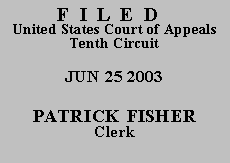

Plaintiff David Daniel, a state prisoner appearing pro se, appeals the dismissal of his civil rights action against Ronald Anderson, the assistant general counsel for the Oklahoma Department of Corrections. Exercising jurisdiction pursuant to 28 U.S.C. § 1291, we affirm.
In 1997, Daniel filed a civil rights action against four individual defendants represented by Anderson. We affirmed the dismissal of claims against two of the defendants, see Daniel v. Merritt, 2000 WL 691101 (10th Cir. May 25, 2000), and Daniel settled with the other defendants. During settlement negotiations, Daniel was advised that any disbursement of funds would be subject to Okla. Stat. tit. 57, § 566.1, which requires:
Any inmate . . . who successfully obtains a final court order or settlement agreement awarding damages for any cause of action in any federal or state proceedings against the state, a state agency, the Department or any political subdivision, or any employee thereof, shall pay or satisfy from the award any previous assessments of court costs or fines involving the criminal convictions of the offender, victims compensation, assessments, restitution awards, probation or parole fees, child support or alimony, civil judgments, and any deficiencies of debts not paid of which the Department of Corrections has notice by judgment, lien, garnishment, or other appropriate process.
Daniel's stepfather, who had custody of Daniel's minor son, had obtained a default judgment against Daniel for unsatisfied child support payments. In addition, Daniel owed probation and parole fees and court costs as a result of several criminal cases. The state court ordered payment of a portion of the settlement proceeds to two Oklahoma counties, a portion to Daniel's stepfather, and attorney fees to the DOC, leaving no funds to pay the expenses of the civil rights action.
Daniel filed this action claiming (1) Anderson seized the settlement proceeds without due process of law; (2) Anderson seized the settlement proceeds in retaliation for filing a previous civil rights action; and (3) Anderson's acts constituted theft and conversion. The first two claims arose under 42 U.S.C. § 1983; the last claim invoked only state law. The district court adopted the magistrate's report and recommendation, dismissing the federal claims and declining jurisdiction over the state law claim. The court also denied Daniel's motion to amend his complaint to add new claims.
We review de novo the district court's grant of a Federal Rule of Civil Procedure 12(b)(6) motion to dismiss. See Ford v. West, 222 F.3d 767, 771 (10th Cir. 2000). We accept all well-pleaded allegations as true and construe them in the light most favorable to the plaintiff.(1) Id. In the end, the issue is not whether plaintiff will ultimately prevail, but whether plaintiff is entitled to offer evidence to support the claims. See Swierkiewicz v. Sorema N.A., 534 U.S. 506, 514-15 (2002). To succeed on a due process claim, Daniel must identify a protected property interest and allege he was deprived of that right without due process. See Gillihan v. Shillinger, 872 F.2d 935, 938-39 (10th Cir. 1989). We assume, without deciding, that Daniel had a protected property interest in the settlement funds.
Based upon a review of the factors identified in Mathews v. Eldridge, 424 U.S. 319, 335 (1976), we conclude Daniel was afforded due process. As an inmate, Daniel had an interest in the settlement proceeds but his ability to exercise control over those funds was limited. See Hampton v. Hobbs, 106 F.3d 1281, 1287 (6th Cir. 1997). The risk of erroneous deprivation was minimal because the funds were used to satisfy his existing debts. To the extent Daniel challenges the validity of those debts, he could have timely contested them in state court.
Daniel argues the district court erred in dismissing his retaliation claim. "An inmate claiming retaliation must 'allege specific facts showing retaliation because of the exercise of the prisoner's constitutional rights.'" Peterson v. Shanks, 149 F.3d 1140, 1144 (10th Cir. 1998). After reviewing the record, we agree that Daniel "failed to allege specific facts necessary to support a retaliation claim." Magistrate Rpt. at 13.
Daniel's motion to amend his complaint was denied because the district court found the new claims were unrelated to Anderson's actions. Daniel does not contest this conclusion on appeal but now seeks to amend his complaint to attack the constitutionality of § 566.1. We will not address this issue as it was not raised before the district court. See Tele-Communications, Inc. v. Commissioner, 104 F.3d 1229, 1233 (10th Cir. 1997).
AFFIRMED. Daniel's motion to amend his complaint and his request to proceed in forma pauperis on appeal are DENIED.
Entered for the Court
Mary Beck Briscoe
Circuit Judge
*.This order is not binding precedent, except under the doctrines of law of the case, res judicata, and collateral estoppel. The court generally disfavors the citation of orders and judgments; nevertheless, an order and judgment may be cited under the terms and conditions of 10th Cir. R. 36.3.
1. The district court considered a Martinez report for purposes of determining whether Daniels had a "possibly meritorious claim" and not for purposes of resolving conflicting evidence. See Hall v. Bellmon, 935 F.2d 1106, 1112-13 (10th Cir. 1991).